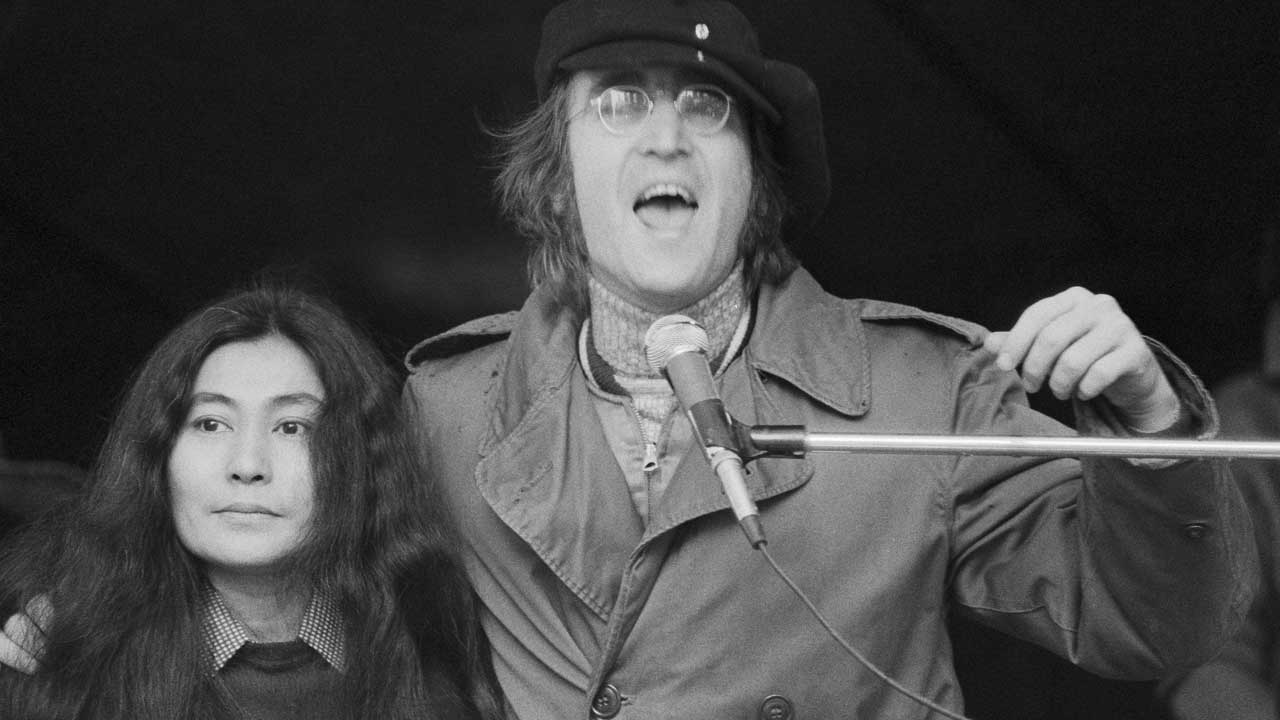The advent of John Lennon’s solo career in 1969 coincided with his immersion in the anti-war movement, human rights issues and various other radical causes. Though his opposition to US involvement in Vietnam brought him into conflict with the authorities, leading to a protracted deportation case and FBI surveillance that posited Lennon as a national threat.
Inevitably, his music reflected his polemical stance, popularising the message with user-friendly anthems like Give Peace A Chance, Power To The People and others.
“Now I understand what you have to do,” Lennon declared. “Put your political message across with a little honey.”

10. Attica State (1972)
First performed at the John Sinclair Freedom Rally at the University of Michigan in December 1971, this bitter condemnation of the American judicial system was sparked by the Attica State prison riots that had erupted two months earlier, leaving 43 people dead. Lennon’s plea for better living conditions also carries a wider remit: “Come together, join the movement/Take a stand for human rights.”
9. Woman Is The Nigger Of The World (1972)
Yoko Ono’s contention that “woman is the nigger of the world”, during an interview with Nova magazine in March 1969, became the basis for one of Lennon’s most controversial songs. His central argument - that his use of the racial slur was to draw a parallel with gender inequality - failed to convince radio stations to lift their airplay ban. Before Lennon performed it on The Dick Cavett Show in May ’72, his host was directed to apologise in advance.
8. John Sinclair (1972)
Lennon’s alignment to writer, political activist and MC5 manager John Sinclair was made explicit when the latter was jailed for ten years for marijuana possession in 1969. The resulting song, driven by Delta blues guitar, helped highlight his situation. Three days after John and Yoko performed it a Michigan rally, Sinclair was released from Jackson State Prison.
7. Bring On The Lucie (Freeda People) (1973)
Conceived around the same time as Imagine and fuelled by David Spinozza’s guitar groove, this anti-Vietnam address also acts as a scathing rebuttal of self-seeking politics. Lennon offers up one of his most impassioned vocal performances: “You slip and you slide down the hill/On the blood of the people you killed/Stop the killing now!”
6. Power To The People (1971)
Driven by Bobby Keys’ fat sax riff and featuring a gospel choir led by Rosetta Hightower, Lennon’s first radical call for action was written in the aftermath of an interview with Marxist newspaper, Red Mole. The message was as simple as the fist-pumping chorus: “Say you want a revolution/We better get on right away/Well you get on your feet/And out on the street.”
5. Happy Xmas (War Is Over) (1971)
Forgoing the usual trite platitudes of the season, Lennon took a Yuletide opportunity to spread a message of peace and launch a billboard campaign in protest at the Vietnam War, led by the simple slogan: ‘WAR IS OVER! If You Want It.’ The song’s universal message, he explained, was “the idea that we’re just as responsible as the man who pushes the button.”
4. Working Class Hero (1970)
The class wars provide the impetus for Lennon’s searing commentary on the repressive nature of institutional power. Delivered in stark tones over bare acoustic guitar, the song also hints at Lennon’s unhappy childhood and bemoans a world suffocated by conformity: “When they’ve tortured and scared you for 20-odd years/Then they expect you to pick a career/When you can’t really function, you’re so full of fear.”
3. Give Peace A Chance (1969)
Lennon’s first non-Beatles single was recorded in a hotel room in Montreal at the tail-end of his and Yoko’s bed-in for peace. Recorded with a bunch of famous visitors that included Tommy Smothers, Allen Ginsberg, Timothy Leary, Petula Clark, Murray the K and the Canadian chapter of the Radha Krishna Temple, it swiftly became a political anthem, sung by half a million people at an anti-war rally in Washington, DC.
2. Imagine (1971)
Detractors tend to dismiss Imagine as pie-in-the-sky liberalism from a rock star cushioned by vast wealth, yet it proposes a radical idea at heart. Inspired by Cloud Piece, a poem from Yoko’s Grapefruit, Lennon eschews any cheap sloganeering, preferring instead to envisage a borderless, religion-free world in which people can just concentrate on the primary business of getting along with one another.
1. Gimme Some Truth (1971)
George Harrison takes lead guitar on this anti-authoritarian rant that doubles as a seeker’s song. Lennon is at his acerbic best here, taking potshots at hypocrites, bigots, prima donnas and White House incumbent, Richard Nixon: “No short-haired, yellow-bellied, son of Tricky Dicky/Is gonna Mother Hubbard soft-soap me/With just a pocketful of hope/Money for dope/Money for rope.”

